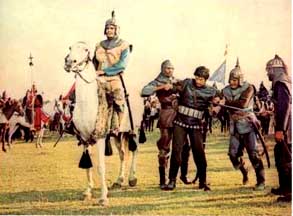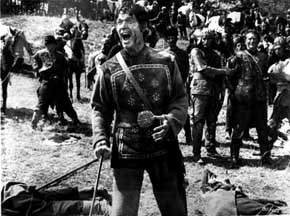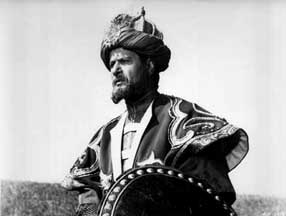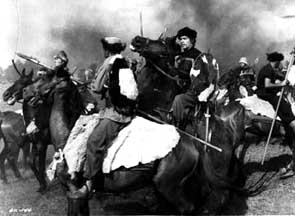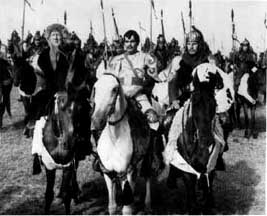|
|
|
Spectacular monster November 15, 2001
In the beginning of the 13th century, Genghis Khan launched what was to become a vast conquest which took him from Mongolia to China in the east through the Persian Empire in the west. It is this odyssey which is illustrated in this film, or more exactly, certain aspects of this odyssey such as the splendors of the Chinese court or the discovery of gun powder.
Genghis Khan (Omar Sharif) conquerer ... As played by Sharif, the Mongol conqueror-to-be is taken captive in childhood by a rival tribal chief, Jamuga (played by Irish actor Stephen Boyd), who dismembers Genghis's father and keeps the boy in a wooden collar (incidents which have eluded biographers). Genghis escapes, and there is much kidnapping to and fro of the heroine (late Françoise Dorleac, Catherine Deneuve's sister).
Tribal chief Jumaga (Stephan Boyd) Genghiz's rival and foe He unites the Mongols (Telly Savalas and others) before traveling peacefully to China. There he lives at the court of the Emperor (Robert Morely ) whom he eventually blows up in a fireworks display. The Mongol conquest of China and parts of the West is briskly covered, with the aid of narration. A resisting sultan of Khwarezm (Eli Wallach) is disposed of, and in a final duel, Jamuga is killed and Genghis is mortally wounded.
Genghis threatens the throne of the Shah of Khwarezm (Eli Wallach) a Persian Sultan It is difficult to portray one of the most bloodthirsty monsters in history in his true colors and still attract paying customers. Genghis was admirable only as a military strategist; perhaps no one has ever mastered the art war, managing enormous troop movement as rapidly as he did, or imposing such perfect discipline on an army. He united the Mongol hordes, conquered and slaughtered without mercy from the China Sea to the Caucasus, killing untold millions and devastating vast areas. He conquered half of the known world, for no apparent reason except that it was there. Jamuga (Stephen Boyd) in the battle field The film does not focus on Genghis as a killing machine. However the film is interesting as a spectacle (shot in Panavision Technicolor). The Chinese sequences please the eye. Stephen Boyd (very good actor but type-casted in epic films ever since "Ben Hur") is a ruthless heavy, and James Mason gives a bravura performance as the courtly, lisping mandarin Kam Ling. Nothing seems to stop Genghis Khan (Omar Sharif)as he leads the Mongol tribes Omar Sharif is better casted as Genghis Khan than John Wayne was in Dick Powell's 1956 film "The Conqueror". It somehow manages to create a Mongol never neverland with stirring battles and magnificent landscapes ( filmed in the steppes of Yugoslavia). As for the costumes (Chinese & Persian) and sets (particularly Old Peking and the Chinese court ) are as lavish as one could imagine.
|
|
 |
Web design by BTC Consultants
Internet server: Global Publishing Group






























